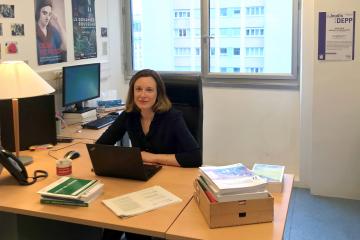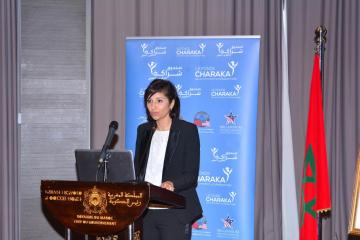
Leading government systems change from within

In February of this year, the Biden administration released a memo affirming their commitment to restoring trust in government through evidence-based policymaking. This movement to apply scientific research to decision-making extends across many countries where J-PAL operates, and presents a prime opportunity for evidence-minded J-PAL alumni to lead change from within.
Careers in government can offer an often unparalleled opportunity to contribute to improving lives on a large scale. To this end, many J-PAL alumni have gone on to occupy positions in governments worldwide, where they work to both rigorously evaluate programs and shape policies based on evidence.
Why does it matter to have advocates for evidence in government? We’ve found that when organizations are involved in the process of generating evidence, they are more likely to apply the results to their decision-making. (Institutionalizing a culture of evidence use is one of the six pathways to policy change we’ve outlined in our Evidence to Policy work.)
Conducting research in-house
Many J-PAL alumni have played key roles in establishing or focusing evaluation efforts within their governments.
Ryan Cooper ‘14, formerly the executive director of J-PAL LAC, now leads the Experimental Policy Initiative within the Budget Office of the Government of Chile. “Abhijit [Banerjee] would say that ideally one should embed in government agencies and work on evidence generation from within,” Ryan said in a new Q&A. “He was right—it’s much easier to promote scientific evidence generation from within the government, and that is exactly what I try to do in the Government of Chile.”
In the United States, Kelly Bidwell ‘15 worked to stand up the White House Social and Behavioral Sciences Team as a senior policy manager at J-PAL North America. Now, Kelly heads the Office of Evaluation Sciences within the General Services Administration, which provides government-wide expertise and support for evidence generation and partners with federal agencies to answer priority questions using rapid and rigorous evaluation. In her recent Q&A, Kelly talked about how her role has changed as administration priorities have shifted, and what she learned from her time at J-PAL and Innovations for Poverty Action.
And in France, Axelle Charpentier '14 built on her experience managing an education evaluation at J-PAL Europe to now lead education policy and practice research at the French Ministry of Education. "It was at J-PAL that I began to develop an expertise in education,” she noted. “I rely on this knowledge in my daily work, and keep developing it through working with my colleagues who produce data at the DEPP, field practitioners, and researchers involved in our studies." Read her Q&A.
How are our alumni leveraging evidence in policymaking and implementation?
Still more J-PAL alumni have become engaged in policy design and the day-to-day running of government, where they are positioned to employ evidence and data in policy decisions.
In India, Jasmine Shah ‘16, former deputy director of J-PAL South Asia, is helping design effective policies and solve implementation bottlenecks in his current role as the head of the Dialogue and Development Commission within the Delhi government. “Leaving the world of J-PAL and entering the world of governance and politics in India has been a change at every single level….” he writes. “But if there’s one thing that has remained a constant through this transition is how deeply committed my colleagues are to impacting lives at scale.”
And Sweta Suman ‘18, former research associate at J-PAL South Asia, is entering the Indian government through a different route: She is training to become an officer in the prestigious Indian Administrative Service (IAS), which forms the backbone of policy design and implementation across administrative units. Sweta is soon to be posted to her first assignment in the state of Chhattisgarh, where she will work on development policy implementation, revenue collection, administration, and public grievance redressal.
Applying lessons from government to J-PAL’s work
We are also tremendously fortunate to count former members of government among our current staff, who bring their expertise and perspectives to strengthen our work and partnerships.
Iqbal Dhaliwal, the Global Executive Director of J-PAL, began his career in the IAS, where he first led a large bureaucracy that implemented numerous development programs in the field, and later helped formulate policy in the state capital. He joined J-PAL in 2009 to launch our policy group to complement the existing research and training verticals. In this article, he described his journey from “instincts to evidence.”
Laura Feeney, Associate Director of Research and Training for J-PAL North America, recounted in a new blog how her time as an economist at the United States Bureau of Labor Statistics helped prepare her for the realities of implementing RCTs. “Through 3.5 years as an industry analyst, I learned valuable lessons for working with people to obtain data, writing clearly about complex topics, and obtaining and interpreting data that continue to resonate in my work.”
Hana Lakhdar Gazal, Deputy Director of the Morocco Employment Lab at J-PAL MENA, came to J-PAL after several years of working with the Moroccan government to institutionalize data-driven approaches to policymaking. “...My experience at the Prime Minister's Office has been helpful on several levels. It’s helped me to understand policymaking culture in Morocco, the constraints that policymakers face in making decisions, and what their expectations may be when entering conversations.”
Esther Duflo, J-PAL’s co-founder and co-director, noted in 2019 that this movement towards a culture of learning and evidence use in government “takes patience, effort, and many, many people.” At J-PAL, our people are the real drivers of our impact. Their commitment to evidence-informed policy at J-PAL and beyond will be the key to ensuring our mission far outlives the organization.
Don’t miss the other posts in our Alumni Voices from Government series:
- Kelly Bidwell ‘15, Director, Office of Evaluation Sciences, US General Services Administration
- Axelle Charpentier ‘14, Head of Office, Office for the Evaluation of Educational Devices and Studies on Teaching Practices, French Ministry of Education
- Ryan Cooper ‘14, Coordinator, Experimental Policy Initiative, Budget Office of Chile
- Amanda Dawes ‘14, Head of Social Policy Division, Ministry of Social Development and Family of Chile
- Nana Okozi ‘16, Project Coordinator, National Institute for Communicable Diseases of South Africa
- Irwan Setyawan ‘17, Program Manager, National Council for Financial Inclusion of Indonesia
- Jasmine Shah ‘16, Vice Chairperson, Dialogue and Development Commission, Delhi Government
- Sweta Suman ‘18, Officer Trainee, Indian Administrative Service


